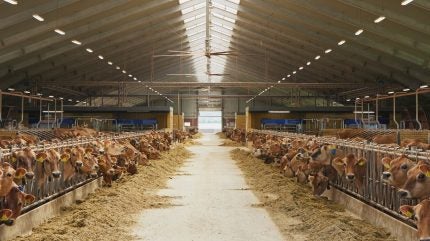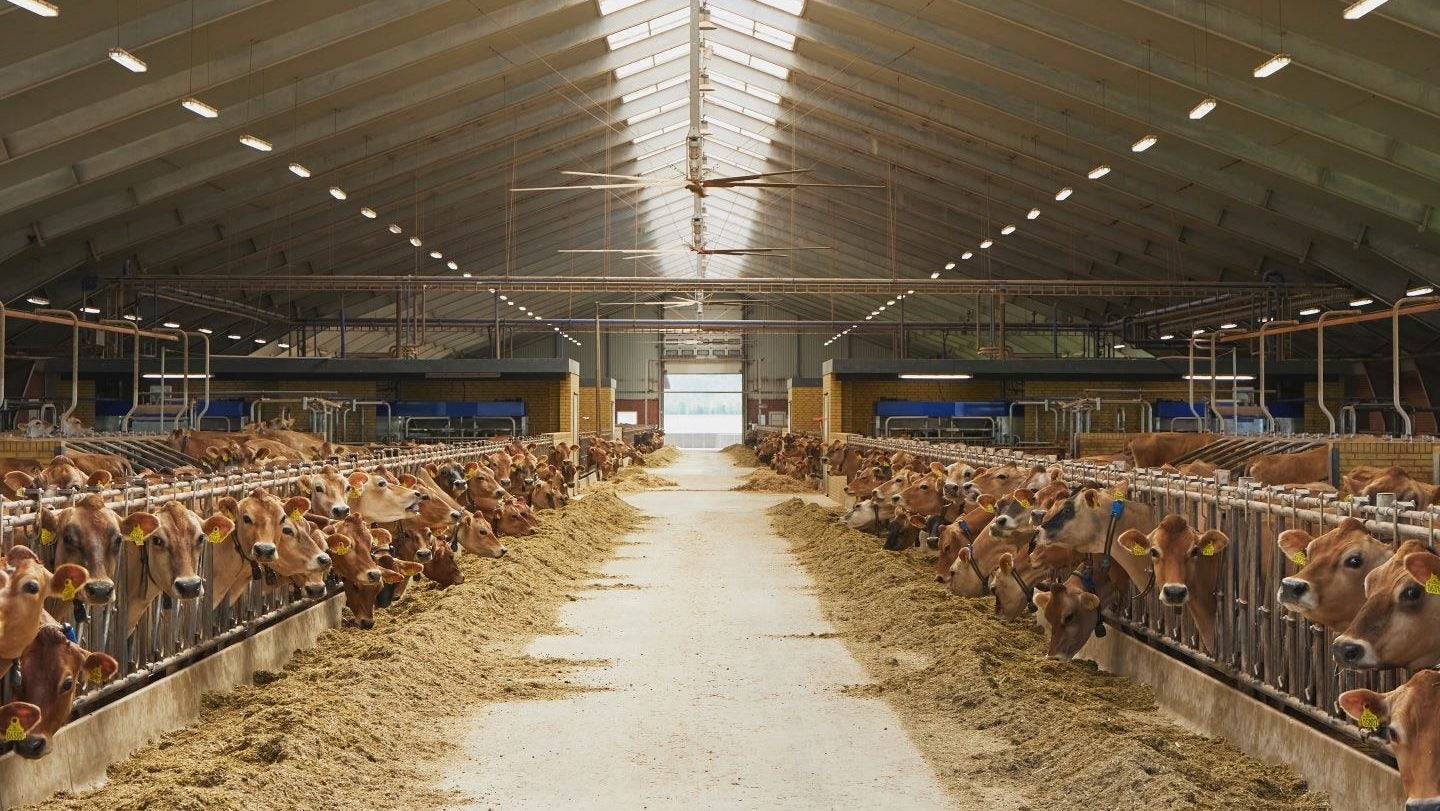
Cows on industrial farm, Denmark. Credit: Viktor Osipenko / Shutterstock
Denmark’s radical plan to introduce a tax on emissions from agricultural emissions including livestock has been approved by the country’s parliament.
The so-called Green Tripartite agreement, in the planning for around a year and first announced in June, has been given the go-ahead after months of negotiations between the country’s major political parties, farmers and environmental groups.
Denmark will be the first country in the world to introduce such a tax and it suggests the move has the potential to reduce emissions by between 1.8 million and 2.6 million tonnes of CO2e in 2030 when it is introduced.
Land conversion is the main driver. The plan is to transform large parts of the country from agricultural production to forestry. The so-called Green Deal will take large amounts of agricultural land out of operation with efforts set to begin in 2027.
It is estimated around 60% of Denmark’s territory is cultivated, making it one of the countries with the highest share of cultivated land, according to a Danish parliamentary report.
Land conversion will see six new national nature parks established and opened by the end of 2030 at the latest.
Access the most comprehensive Company Profiles
on the market, powered by GlobalData. Save hours of research. Gain competitive edge.

Company Profile – free
sample
Your download email will arrive shortly
We are confident about the
unique
quality of our Company Profiles. However, we want you to make the most
beneficial
decision for your business, so we offer a free sample that you can download by
submitting the below form
By GlobalData
Country *
UK
USA
Afghanistan
Åland Islands
Albania
Algeria
American Samoa
Andorra
Angola
Anguilla
Antarctica
Antigua and Barbuda
Argentina
Armenia
Aruba
Australia
Austria
Azerbaijan
Bahamas
Bahrain
Bangladesh
Barbados
Belarus
Belgium
Belize
Benin
Bermuda
Bhutan
Bolivia
Bonaire, Sint
Eustatius
and
Saba
Bosnia and Herzegovina
Botswana
Bouvet Island
Brazil
British Indian Ocean
Territory
Brunei Darussalam
Bulgaria
Burkina Faso
Burundi
Cambodia
Cameroon
Canada
Cape Verde
Cayman Islands
Central African Republic
Chad
Chile
China
Christmas Island
Cocos Islands
Colombia
Comoros
Congo
Democratic Republic
of
the Congo
Cook Islands
Costa Rica
Côte d”Ivoire
Croatia
Cuba
Curaçao
Cyprus
Czech Republic
Denmark
Djibouti
Dominica
Dominican Republic
Ecuador
Egypt
El Salvador
Equatorial Guinea
Eritrea
Estonia
Ethiopia
Falkland Islands
Faroe Islands
Fiji
Finland
France
French Guiana
French Polynesia
French Southern
Territories
Gabon
Gambia
Georgia
Germany
Ghana
Gibraltar
Greece
Greenland
Grenada
Guadeloupe
Guam
Guatemala
Guernsey
Guinea
Guinea-Bissau
Guyana
Haiti
Heard Island and
McDonald
Islands
Holy See
Honduras
Hong Kong
Hungary
Iceland
India
Indonesia
Iran
Iraq
Ireland
Isle of Man
Israel
Italy
Jamaica
Japan
Jersey
Jordan
Kazakhstan
Kenya
Kiribati
North Korea
South Korea
Kuwait
Kyrgyzstan
Lao
Latvia
Lebanon
Lesotho
Liberia
Libyan Arab Jamahiriya
Liechtenstein
Lithuania
Luxembourg
Macao
Macedonia,
The
Former
Yugoslav Republic of
Madagascar
Malawi
Malaysia
Maldives
Mali
Malta
Marshall Islands
Martinique
Mauritania
Mauritius
Mayotte
Mexico
Micronesia
Moldova
Monaco
Mongolia
Montenegro
Montserrat
Morocco
Mozambique
Myanmar
Namibia
Nauru
Nepal
Netherlands
New Caledonia
New Zealand
Nicaragua
Niger
Nigeria
Niue
Norfolk Island
Northern Mariana Islands
Norway
Oman
Pakistan
Palau
Palestinian Territory
Panama
Papua New Guinea
Paraguay
Peru
Philippines
Pitcairn
Poland
Portugal
Puerto Rico
Qatar
Réunion
Romania
Russian Federation
Rwanda
Saint
Helena,
Ascension and Tristan da Cunha
Saint Kitts and Nevis
Saint Lucia
Saint Pierre and Miquelon
Saint Vincent and
The
Grenadines
Samoa
San Marino
Sao Tome and Principe
Saudi Arabia
Senegal
Serbia
Seychelles
Sierra Leone
Singapore
Slovakia
Slovenia
Solomon Islands
Somalia
South Africa
South
Georgia
and The South
Sandwich Islands
Spain
Sri Lanka
Sudan
Suriname
Svalbard and Jan Mayen
Swaziland
Sweden
Switzerland
Syrian Arab Republic
Taiwan
Tajikistan
Tanzania
Thailand
Timor-Leste
Togo
Tokelau
Tonga
Trinidad and Tobago
Tunisia
Turkey
Turkmenistan
Turks and Caicos Islands
Tuvalu
Uganda
Ukraine
United Arab Emirates
US Minor Outlying Islands
Uruguay
Uzbekistan
Vanuatu
Venezuela
Vietnam
British Virgin Islands
US Virgin Islands
Wallis and Futuna
Western Sahara
Yemen
Zambia
Zimbabwe
Kosovo
Industry *
Academia & Education
Aerospace, Defense &
Security
Agriculture
Asset Management
Automotive
Banking & Payments
Chemicals
Construction
Consumer
Foodservice
Government, trade bodies
and NGOs
Health & Fitness
Hospitals & Healthcare
HR, Staffing &
Recruitment
Insurance
Investment Banking
Legal Services
Management Consulting
Marketing & Advertising
Media & Publishing
Medical Devices
Mining
Oil & Gas
Packaging
Pharmaceuticals
Power & Utilities
Private Equity
Real Estate
Retail
Sport
Technology
Telecom
Transportation &
Logistics
Travel, Tourism &
Hospitality
Venture Capital
Tick here to opt out of curated industry news, reports, and event updates from Just Food.
Submit and
download
Visit our Privacy Policy for more information about our services, how we may use, process and share your personal data, including information of your rights in respect of your personal data and how you can unsubscribe from future marketing communications. Our services are intended for corporate subscribers and you warrant that the email address submitted is your corporate email address.
From that year, farmers will have to pay a levy of DKr300 ($43) per tonne of methane (as per carbon dioxide equivalent) on emissions from livestock including cows and pigs, which will rise to Dkr750 in 2035.
But, as part of a package to support the move, the government will offer subsidies.
In a statement confirming the deal’s approval, Jeppe Bruus, Minister for the Green Tripartite, said: “I would not hesitate to call this a historic result. With the agreement, we are now allocating Dkr43bn to carry out an enormous restructuring of Denmark’s land area.
“Danish nature will change in a way we have not seen since the wetlands were drained in 1864. Denmark will be the first country in the world to introduce a CO2e tax on agriculture.”
However, the Ministry to keen to stress that agriculture will still be fundamental to the country’s economy.
It said: “The conversion of the Danish agricultural and food industry must take place in a way that supports an increasingly sustainable, high-tech and area-efficient agricultural production, so that Denmark will also have a competitive industry with attractive business potential and jobs in the future.”
The deal agreed by the Danish government also promotes plant-based foods, providing an additional DKr420m for the Plant Based Food Grant between 2025–2030.
The move that has been welcomed by the organisation ProVeg. CEO Jasmijn de Boo said: “Animal agriculture is responsible for up to a fifth of global greenhouse gas emissions, a fact that has been ignored or sidelined for too long. Further delay in action to reduce emissions from this sector will only worsen the situation for farmers as the climate crisis intensifies.”
